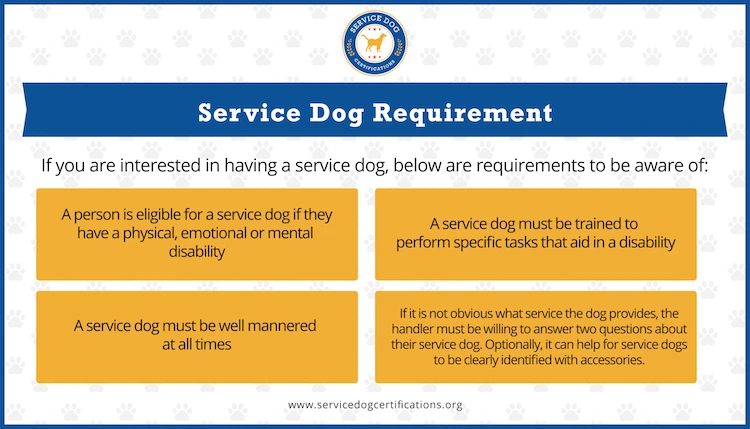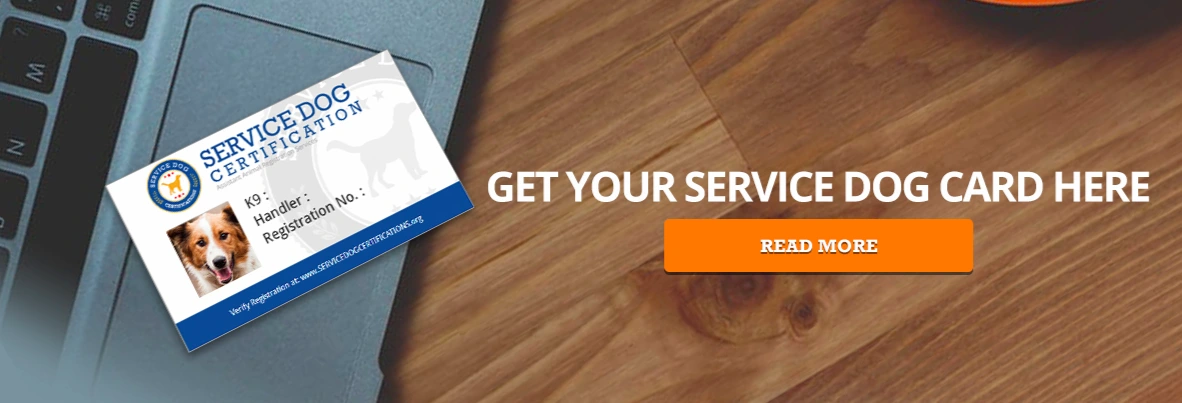Can You Get a Grant for a Service Dog?

Dogs are helping humans in many ways. For individuals with disabilities, dogs can perform tasks to assist them with daily tasks the handler could not do by themselves. These service dogs can greatly improve their owner’s life or even perform life-saving tasks. However, a good service dog comes with a cost. In this article, we’ll look at the possibilities of getting a grant to sponsor a service dog.
The Price of a Service Dog
Because the work service dogs perform is so vital, a service dog’s cost can be steep. The price depends on the service dog’s breed and training, but a trained service dog from a reputable organization can cost 10,000 to 40,000 dollars. Little Angels Service Dogs, a non-profit that sells service dogs, estimates their service dogs cost about 38,000 dollars to train. Although it’s possible to train your service dog, finding the right dog and putting in the time and effort to teach them can have its costs. And unfortunately, it’s not guaranteed that the dog you choose to train will be able to perform the tasks you need in the end.
Obtaining a Grant for a Service Dog
To help mitigate the cost of a service dog, many service dog agencies offer grants. These organizations are usually non-profits, foundations, or businesses that assist people who are disabled and need a service dog. Most of these agencies require that you apply and give verifiable documentation of your disability to qualify for a grant.
A grant is not a loan; it doesn’t require repayment to the people you received the grant from. Some organizations receive donations from the public or funds from the government to obtain and train service dogs, and grants are used in place of cash payment for these dogs from the person in need. Some grants may cover the full cost of a service dog, while others may provide partial payment, and the recipient of the dog must cover the rest. Applying doesn’t always guarantee a service dog, but the process is straightforward.
Steps to Get A Grant for a Service Dog
1. See a Doctor
Before starting the process of seeking a grant for a service dog, you should speak to your doctor. Most organizations will require a letter or prescription from your doctor stating that a service animal can help you manage your disability. Your doctor should note what type of meaningful assistance the service could provide to mitigate the issues caused by your disability.
2. Look for an Organization and Apply
Luckily, some organizations exist to help people with disabilities obtain a service dog. A few organizations cater to a particular location or demographic (for example, veterans), so it’s a good idea to investigate the organization before applying. Look for reputable agencies with good reviews, and don’t be shy to ask other people for their opinion.

Here are a few reputable organizations that offer grants for service dogs:
NEADS
NEADS is a highly reputable organization with a long history in the service dog industry. Although the service dog’s cost is free, each client must agree to fundraise $8,000 with the help of NEADS fundraising kits and resources. NEADS offers service dogs for children, veterans, and adults who are hearing impaired.
Patriot Paws
Patriot Paws work with military veterans to connect them with the right service dog to help with their disability at no cost. Although all veterans may apply, priority goes to Desert Storm veterans.
Paws with a Cause
Paws with a Cause is a non-profit which operates through public donations. Service dog applicants pay a nominal fee to apply for a service dog. If approved, service dogs are provided at no cost. To qualify, applicants must have a physical disability, seizure disorder, a hearing impairment, or have a child with autism.
Who Gets a Grant?
Technically, grants go to organizations, not individuals. This is why people seeking a service dog must apply to a non-profit or business to receive a service dog funded through grants. Remember that you may not receive a service dog immediately and may need to apply to many organizations. Part of the application process requires verifying your information, and a field agent may come to your home to evaluate whether it’s safe for a service dog.
Note that the yearly costs of a service dog from grooming, veterinary fees, and food are often not included. Therefore, the recipient must have the financial ability to provide for the service dog for the years to come.
About the Author: The writing team at Service Dog Certifications is made up of folks who really know their stuff when it comes to disability laws and assistance animals. Many of our writers and editors have service dogs themselves and share insights from their own experiences. All of us have a passion for disability rights and animals.
Related Articles

Hipster Dogs: Trendy Pups, Beards, and Beanies
From PBRs to beanie caps, and from plastic sunglasses to “pawsome” music, hipster dogs have taken the world by storm — and there’s no turning back. Because, let’s face it, these little guys and gals were rocking the style before it was cool — not that they would care what’s cool, though. For a “pawsitevly” […]

Read More

How Dogs Can Calm Anxiety
A person suffering from anxiety attacks experience many risks, and it’s one of the reasons why it’s prudent to consider having a service dog or emotional support animal as a companion. The animal can keep the environment safer for the individual and below are some of the ways a dogs can calm anxiety: 1) Dogs […]

Read More

Can Cats Be Service Animals?
Having a cat brings the same positive effects as dogs. These pets can be equally beneficial to a person’s health. Experts have proven that cat owners are less likely to have a health emergency, such as a heart attack, with their feline companion around and cats have also been proven to help alleviate sleeping disorders, […]

Read More



We have a golden retriever who is 2 years old.
My grandson has autism. He is 10. He just got tested academically and we learned that he is moderately intellectually disabled as well.
I would like information on how to get my dog trained (by someone else) to be an emotional support animal or a psychiatric support animal for him.
On a side note, his brother who is turning 4 in a few weeks is being screened for autism on 5/21/22.
If you are looking to get an emotional support animal, there is no training needed. ESAs do not require any specialized training – they help people by being present during difficult times. To qualify for an emotional support animal, you need an ESA letter: https://www.servicedogcertifications.org/how-to-get-an-emotional-support-dog-letter/
I am diabetic and my sugars are not well contained my sight is blurry and I am trying to see.if I could qualify for a service dog
Qualifying for a service dog with your condition would require two things: 1. your condition rises has to be a disability that qualifies for a service dog and 2. you can train a dog to perform tasks to help with that disability.
Melissa Palladino
I am diagnosed with PTSD Agoraphobia bi polar1 and bad diabetic. I am trying to get help getting a service dog for my PTSD anxiety panick attacks I am home bound but I know if I had a service dog to help me when Im out when I panick or get anxious. My diagnosis is very dabilitating I dont go out side. I cant afford one so I am looking for a grant. I can get documents for everything.
I would start with looking up ada.gov/servicedogs this will give you information on any questions you might have then you can Google trainers in your area or train your dog yourself it sounds like you want and need a service dog not an emotional support animal
I have seizures and I have PTSD from being traumatized I just can’t afford to buy a service dog they’re expensive but I really need one
Im an Iraq veteran with ptsd and depression and anxiety as well as seizures I’m desperately hoping to geta service dog.
Thank you for your service. We always recommend first talking to your doctor. We also wrote an article about pathways you can explore as a veteran to get a service dog which you might find helpful. We wish you the best of luck!
Any other organizations that could assist me? I had an emotional support Staffy Terrier, who died earlier this year. She was constantly by my side, helping me get up from sitting position, walk more safely, as I have balance issues, and for anxiety, she calmed me.
I would love to have a service dog similar to her. As I am in my early 70’s, it would be ideal for me to get a Staffy who is already trained.
Thank you!
Jana
Unfortunately we do not provide referrals, but we hope you find the help you need. You may want to speak to your healthcare provider as a starting point.
I have congestive heart failure see here bipolar disorder and I need a dog that can help me with these three issues of mine I’m also in a wheelchair so I would need one to be trained to go around a power wheelchair if anybody knows anything any place that can help me I can’t afford to buy one going to be helpful to get one donated to me.
Unfortunately we do not provide adoption or training referrals but we wish you the best of luck in your search.
I suffer from ptsd. I have a son who is just a year old. I want to be able to have a dog to check rooms and possibly be able to alert me if they can sense a panic attack or trigger before I can so I can get to a safe place. I have been through therapy for ptsd, tried emdr, have my medical card for it and looking to further protect my mental health. Financially I cannot afford a service dog but I’m very much in need of one. Do you think I would qualify for a grant or some sort of financial help?
Unfortunately we do not provide referrals for grants or financial assistance, but we wish you luck on your search. One thing to keep in mind is that you are allowed to train your own service dog. You may want to look into training a service dog with the help of a professional trainer.
Hi I need a service dog for the following reasons: 1. I have balance and mobility issues
2. I have anxiety, clinical depression and bpd
3. I have diabetes and need help remembering to check my sugar levels
4. I believe I may have ptsd from being bullied although school
We do not provide referrals for service dog adoptions or training, but we wish you the best of luck in your search.
I have social anxiety, depression, ptsd, and BPD. I have a 3 year old goldendoodle and would like to get her trained and a service dog for medication reminder, anxiety accistance in public and to help with my tics and panic attacks.
I found your website to be very informative. However, I am looking for an organization, who helps low income disabled individuals with a grant in the amount of $3,000 in order to purchase my Service Dog. She is a Mini GoldenDoodle and will be ready for me to pick her up on October 31, 2022. I will train her myself or will look for a grant that will pay a trainer I know in my hometown, who is totally capable of training her and I can partake in her training as well, I am fortunate enough to be able to purchase a service dog for $3,000 instead of the high fees I have found, but I have yet to find any organizations who give grants for purchasing a service dog. I have found many that claim they do, but they don’t. I am alone and live on social security so $3,000 is a lot for me to pay. A service dog would be great for me and would improve my quality of life tremendously. Any suggestions or information you might have would be greatly appreciated. Thank you.
Unfortunately we do not provide referrals for service dog financial assistance, but we wish you the best of luck in your search.
I am in need for funding of a service animal. I have a critical brain injury requiring me to have such an animal. I currently have the dog in training but need help finishing the process. Is there such a way to get this accomplished?
Unfortunately we do not provide referrals for grants, but we wish you the best of luck in your search.
Iam a combat veteran diagnosed with PTSD , anxiety, depression, bipolsr 1, alcohol use disorder. i was inquiring about how i can go about qualifying for adopting a service dog.
Unfortunately we do not provide referrals for service dog adoptions. We wish you the best of luck in your journey. If and when you do qualify for a service dog, we would be happy to serve you if you require service dog paraphernalia.
I’m 57 years old disabled female that became disabled at 43 when I fell and broke my whole lower back and tale bone, I lost my fur baby 5/22. She was 141/2 and would love another so I can go on walks again to keep my back and core strength and feel safe to walk again so I’m not alone .
We’re so sorry to hear about your loss and hope you find a new service dog soon.
How can I get an emotional support service dog
Emotional support dogs and service dogs are two separate categories of assistance animals. For information on qualifying for an emotional support dog, please see this link: https://www.servicedogcertifications.org/how-to-get-an-emotional-support-dog-letter/
Am looking for a non profit agency in where
I can get a service dog at minimal or no cost to me. If you know of any please let me know and how can i get in contact…thank you
Unfortunately we don’t provide referrals for service dog adoptions, our services are only for already qualified owners. We’ll leave your comment here however in case someone can help.
I don’t know if I qualify for a dog
You might find this post helpful for some basics on service dog requirements: https://www.servicedogcertifications.org/service-dog-requirements/
I have seizures and migraines due to a brain injury. I also suffer from chronic pain and fibromyalgia. I have a dog but he dosent alert during symptoms. We cannot afford to purchase a service animal, but we can do veterinary services etc. I need a dog that can alert to early onset symptoms especially when I’m alone or with people that don’t get my signs before an episode. We are big fans of shelter dogs.
If you can’t afford the purchase of a trained serviced dog, self-training with the help of a professional trainer can be another option. Training a service dog on your own or with help is allowed under ADA rules, you do not necessarily have to purchase an already trained service dog.
Disabled Veteran (80%) with Anxiety Disorder. Haven’t been diagnosed with PTSD although I have a lot of the symptoms; working on that with the VA. My psychiatrist at the VA clinic says a service dog would be a good idea. Do I qualify, and how do I get started if I do?
Please see this article for some basics on service dog requirements: https://www.servicedogcertifications.org/service-dog-requirements/
I have multiple physical issues like multiple sclerosis, myastinia Gravis, Adiisions disease, POTS, Migraines, and severe Asthma. My husband recently passed away 8/11/23. I have a 9 mo old sheepadoodle puppy who is very smart and loves to learn. I can not afford to buy a service dog. I had a trainer work with her several times and she said she felt she was capable of being a service dog. She was generous enough to do is for free. Currently I have no income until SS evaluated my husbands SS benefits for me. I am disabled because of my health issues but haven’t worked since 1994. I will receive 1120 for His pension beginning Oct 1 Can I get a grant and possibly a facility that would be willing to train her for me now that I live by myself. I live in south New Jersey.
I’m 62 with severe anxiety and depression I’m not a veteran just a lady who worked hard to take care of her family who needs a puppy who can help me not go into the anxiety spiral I’m poor live month to month I need something to help me get through each day
You may want to speak to your healthcare provider about whether an emotional support animal or psychiatric service dog could help you: https://www.servicedogcertifications.org/psychiatric-service-dog/
Hello my service dog of 13 yrs just passed away a week ago I have seizure disorder sleep apnea,I am trying to get another service dog or help with training another one and hope soon because I also have PTSD which when my anxiety gets to high i endurance having seizures my previous girl helped me live a better stable life i am afraid my health will deteriorate and take me back to where i can’t function if any one knows where i can get assistance please help.
Would someone that is 70 and has MS and diabetes be considered?
There are no age limitations when it comes to who can own a service dog. The important criteria is that the person has a health condition that is an eligible disability and has a need for a task-trained dog to assist with that disability.
I have hemiplegic migraines. It’s a rare neurological disorder that looks like a seizure and ends like a stroke and I also have type 2 diabetes. Whenever my blood sugar gets too high or too low I tend to pass out. Would my disabilities be considered an eligible disability for a task trained dog that could assist with my disabilities?
The criteria for having a disability under the ADA is whether your impairments “substantially limit one or more major life activities”. If your condition substantially limits your ability to function in an aspect of daily life, you may qualify. We recommend speaking to your healthcare professional about your specific condition and needs. The other consideration is whether your condition would be helped by a dog performing a specific task or job. That could be another point of discussion between you and your healthcare provider.
My therapist recommended that I get a service dog for depression anxiety and panic attacks and depression
Yes, there re serice dogs specifically for people with diabetes.
I have type two bipolar disorder and OCD along with severe anxiety and severe depression. I’m currently in the process for approval from my psychiatrist to get the approval for a service dog, my therapist has already recommended the need for one. Is there any grants I would be able to receive for a psychiatric one that could travel with me to college? I’m new to this and don’t really k now anyone with a service dog…
Hi I’m 51 years old and I have heart problems as well I have depression and anxiety , chronic migraines, recently diagnosed with autoimmune disease , I have sciatic nerve pain, diabetes, cirrhosis of the liver I was just told I had don’t know how bad I am waiting to see a gastroenterologist this month on the 23 so I don’t know if I would even qualify for this but I figured I would give it a try a friend told me I should check it out that it might not hurt to get information on it so here I am
I’m a health care provider whom works in the ER, was recently attacked by a patient. Currently recovering ❤️🩹 diagnosed with a TBI, PTSD, anxiety, depression also tenitius migraines and a shoulder injury. Would I qualify?
Qualifying for a service dog requires two things: 1. Your condition must be an ADA eligible disability (i.e., a physical or mental health impairment that substantially limits a major life activity) and 2. You must have a dog that has been trained to perform a job or task related to that disability.
I am legally disabled and meet that requirement. My dog was a rescue and he helped me a lot with a number of my issues, he was older but very trainable . Unfortunately he passed away and my health has taken a decline in the past year. Sometimes it’s as simple as having him get a person for me or laying on my legs due to spasms, etc. I don’t have the ability to train another shelter dog currently. Is there an affordable way to qualify for a trained one?
I need my dog to be service dog.
We recommend click this link for basics on service dog requirements.
I have a non verbally far over the spectrum diagnosed with fragile x sybdrome and autism 9 year old. He can’t do anything on his own. But my mom owns a dog and it’s like the only thing that matters to him qhen she’s around it makes him smile it will stop his crazy fits he throws or crying boughts. He tries to bang his head hurt himself but dogs just do it he loves to be around any dog to heat them bark all kinds of things. I want to get a dog for him.
I have ptsd major depression issues mild schizophrenia hearing issues nonepileptic seizures and in a wheel chair. I’d love to know if this qualifies for a service dog.
Those conditions can qualify if you meet two other requirements: 1. the health condition has to be considered a disability, which means it substantially limits one or more major life activities and 2. you must have a need for a dog that performs specialized trained tasks to assist with your disability.
My son has ASD 1, ADHD, and is learning social skills and communication issues. He is high functioning, however, he cant see social cues that can potentially put him in danger. He is quite literal when speaking, but as a listener and can be challenging for him to read between the lines. He can be dysregulated from burnout, communication barriers, and as he grows medication changes. I am wondering if a support animal would be able to sense dysregulation before it comes on and help regulate helping with a mind reset. The usual sensory items are not as useful, but with social difficulties I think a companion that can also be trained to helo regulate emotions might be effective. I am just unsure if that is what you are offering or if that is something that support animals are not trained to do. Let me know best course of action towards support animals whether dog or cat etc…
Hello there, thanks for your comment. Unfortunately we can’t offer any advice for your son’s situation. We recommend speaking to his doctor or therapist about how a support animal could help with the challenges he faces. Both emotional support animals and service dogs are frequently used by people with ASD and ADHD.
I have a son with autism’ and ADHD. He shows aggressive behavior when he is anxious and stressed and he doesn’t seems to notice when he must stop or when he is crossing the line. Also he don’t understand personal space boundaries and very often he have problems with other peers. We were thinking that maybe a trained dog could help him with some of this issues. What should I do to see if he qualifies for a service dog, what documents from doctor we need?… thanks so much for the work you do and for your answer.
We recommend speaking to your son’s healthcare provider or therapist about how a service dog might help. An emotional support animal is another option you may want to explore. Many people with autism and ADHD find the presence of an emotional support animal very helpful. To qualify for a service dog you don’t need a doctor’s note, but your son’s condition has to be considered a disability and the dog must be trained to perform a task specifically relating to that disability.
Good evening,
I am an active duty military member with PTSD, which is triggered by aircraft, loud noises and bangs, anxiety, depression, a recent TBI which has caused vertigo and balance issues. Additionally, I have arthritis in several areas; most severe in my knees. Do I need to submit the application to see if I qualify? Also, are there hypoallergenic dogs that get trained?
I also have a 16 yr old son with Autism, anxiety, severe depression, sensory disorder and a learning disability. Would he be qualified as well for a service dog?
Thank you for your support and program.
Thank you for your service! Unfortunately we don’t offer any service dog grants, nor do we offer any medical advice. We recommend speaking directly to your healthcare provider to see whether a trained service dog could help with your condition. We wish you all the best and hope you get the help you need.
I have seizures and can never tell of course when they’re coming on, my mom lives with me and I guess it would be good to have a service dog to alert someone when I’m having one, but I don’t even know where to begin.
Our recommendation is to discuss this with your doctor, that’s always the best place to start when it comes to your medical needs.
Hi my name is Michelle I have anxiety panic attack chronic migraines heart issues ( mitral pro labs ) high blood pressure problems an some loss in left were I can’t hear some times I wanted to find how I get funding for help get service dog gets along with cats so I have way I know when go thru chronic migraine or anxiety attack…. Ty Michelle Coates
Can anyone help me? I am searching for a PSD trainer near me (North Georgia). I am ready to give up and just accept that my panic, anxiety and depression with agoraphobia will just keep me home forever. I have tried training my dog using online training and he is doing well, it’s just the outside world training that I am struggling with. How can you train your dog to help you in public when you are terrified of being out in public? I am on disability for this cruel disease and my quality of life is deteriorating, which only fuels my depression. I NEED a dog to (preferably my dog) to alert and respond to my stress, anxiety and panic. I need him to distract my brain, lead me to exits, and keep me from passing out or hyperventilating. Is there such training? In my younger years I was a dog groomer, even owned my own business. I find more comfort from a dog than I do with people!
You might find this resource useful: https://www.servicedogcertifications.org/dog-trainers/
We wish you the best of luck finding the help you need!